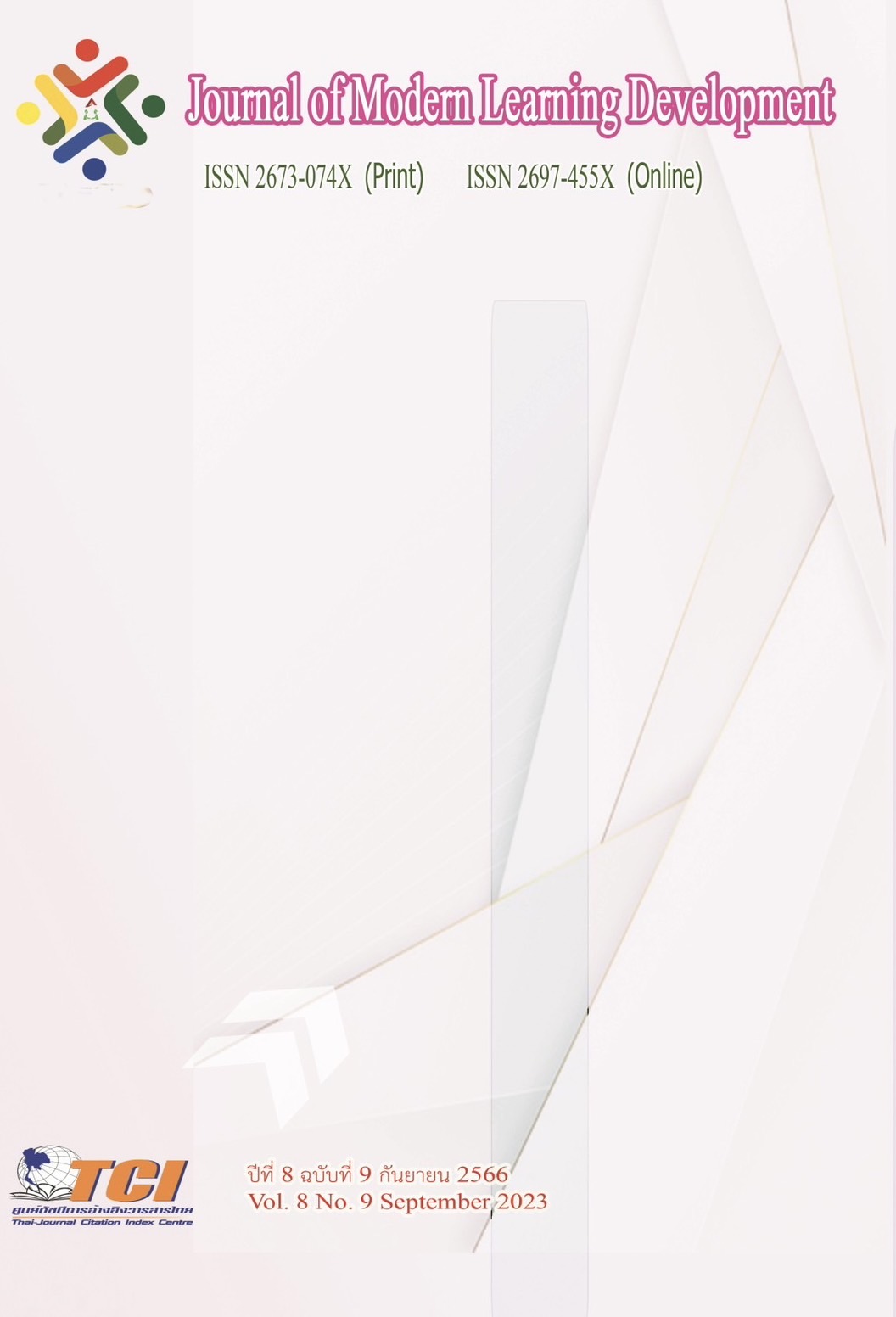Educational Management Between Communication University In Liaoning And Bangkook thonburi University the Background of "One Belt and One Road”
Main Article Content
บทคัดย่อ
The objectives of this research were:(1). To examine the components of effectiveness in Liaoning Communication University and Bangkok Thonburi University.(2).To study the Effectiveness of China-Thailand educational management exchange research(3).To Proposed the guiding principles of Effectiveness Liaoning Communication University and Bangkok Thonburi University under the influence of the one Belt and one Road Policy.
The research method is a mixed method, including qualitative and quantitative research. The selection of population comes from two universities a total of 2082 lecturers, professors and managers. This study intends to conduct an empirical study on the effective educational management mechanism of Liaoning Communication University and Bangkok Thonburi University, and further explore the factors that constitute the educational management mechanism of the two schools under the influence of the one Belt and one Road. The sample selection method is to use G*power tool to randomly select 412 samples from 2082 people from the Bangkok Thonburi University and Liaoning Communication University by means of targeted sampling, the tools used for data collection included semi-structured interview sheets, five-level rating scale questionnaires and focus group discussion sheets. The response rate of questionnaires received in this chapter was 100%.
Research Finding were 1.The effectiveness Educational Management component of Liaoning Communication University and Bangkok Thonburi University include four components 1) Effective education management 2) development of education management of private universities 3) development of private universities and 4) The influence of one Belt and one Road policy factors on college talent training. 2. Effectiveness of china-Thailand educational management exchange research shown in the adaptation indexes meet the requirements, indicating that the model scale matches well, the model fits well, and the model test results can be analyzed to test the fit of the data and the model. 3. There are 38 guidelines for effectiveness Educational Management for 4 Components Consist of Components 1 Effective education management, There are 9 guidelines. Component 2: Development of Chinese private universities, There are 4 specific guidelines. Component 3: Development of private universities, There are 5 specific guidelines. Component 4 :The influence of one Belt and one Road policy factors on college, There are 12 specific guidelines.
Article Details
เอกสารอ้างอิง
Bao C Y.(2008). Characteristics of financial management in Japanese private universities and its Enlightenment: A case study of Keio University [J]. Modern Education Science (Higher Education Research). (2), 35-39.
Cui Laiting&Yan Yunting(2014).A Sino-US Comparative Study on the Higher Education Cost-sharing Mechanism of the Private Institutions. Meitan Higher Education. (05),4-10
Dong S Z.(2007). Thinking about the property rights of legal persons in private colleges and universities -- Based on the investigation and analysis of the legal persons' property of 45 private colleges and universities.] Research on Educational Development. (14).1-5.
Dong S Z.(2010). On the construction of supervision system of private colleges and universities. Education and Occupation. (2), 5-7.
Feng Shujuan & Xu Qingqing. (2009) Some Considerations on family management of private Colleges and Universities in China [J]. Research on Educational Development., (12), 39-43.
Guo B & Li C.(2011). The development of American private universities for reference to China's higher education [J]. Journal of Dalian University. (5), 88-93.
Hua Lingyan. (2008). A Comparative Study on Raising Funds for Private Higher Institutions between China and America.(11),Studies in Foreign Education. 38-42
He Changsong. (2005)The Legal theory analysis of the Board of Supervisors System of private Colleges and Universities [J]. Hunan Social Sciences. (3), 64-66.
jian-ping tang. (2003)after joining the WTO of our country private higher education development strategy research [D]. Wuhan University of Technology; 79
jin-feng Chen. (2001)current our country the plight of private higher education and reform train of thought research [D]. Southwest Normal University; 50
Junzhong Gu & Jing Yang. (2016). English Chinese Multimedia Technology Dictionary: Shanghai Jiao Tong University Press. 09, 154
Li Li & Wang Anxing. (2020) Who the President represents: A probe into the agent Problem of mixed ownership vocational colleges [J]. Forum on Vocational Education.,(10).41~46.
Li Jianmin(2013).Development Course of Government Subsidies for Private Universities and Colleges in Japan. Journal of Zhejiang Shuren University (Humanities and Social Sciences). (06),23-28
Li Qian&Zhang Liang (2020). The Main Characteristics of the Development of the First-class Private Universities in Asia and Its Enlightenments. Journal of National Academy of Education Administration. (02), 32-42
Li Wei&Tian Mi (2012). Enlightenment of Philippines’s Private Higher Education on China’s Civilian-run Universities. Crossroads:Southeast Asian Studies. (12), 71-74
Xu Xuqing. (2011), Carrying out Classified management to promote the construction of high-level private Colleges and Universities [J]. Journal of Shuren University of Zhejiang. (4), 12-15.
Yan Liping. (2001)Research on Public Assistance in Chinese Private Colleges and Universities in [D]; Shantou University; 5-8.
Yang Gangyao & Que Mingkun. (2021)The goal positioning and realization path of high-quality development of private Colleges and Universities under the new development pattern of [J]. Education and Occupation. (19), 83~88.
Zeng X Z.(2012). Thinking about the current situation of classified management of private colleges and universities. The Chinese Market. (27), 28-29.
Zhang Chuting. (2009) On University Presidents [J]. Higher Education Research. (7), 1-9.
Zhang Dewen. (2020) Characteristics, Experience and Enlightenment of the development of private Higher Vocational Colleges in Shanghai [J]. Education and Occupation. (22), 75~80.
Zhang Guangjin & Wang Xin. (2007) Comparative Analysis and Enlightenment of University Presidents' Group Characteristics in China and America [J]. Fudan Education Forum. (4), 61-65.
Zhang Sugang. (2001) The Research on the Policy of Private Higher Education in [D]; Xiamen University. 01 -118
Zhang Xuan & Fan Liying. (2019) Problems and Improvement paths in the formulation of Party building Policies in Private Universitie s [J]. Teacher and Tao (Teaching and Research). (11).
Zou F W. (2017). Research on Party building of independent Colleges in the new era. Changjiang University, 48.
Zhu Beixin&Lu Shuangshuang(2016)Analysis of the Role of the Thai Government in the Development of Private Higher Education. Journal of Zhejiang Shuren University (Humanities and Social Sciences). (06), 26-31


